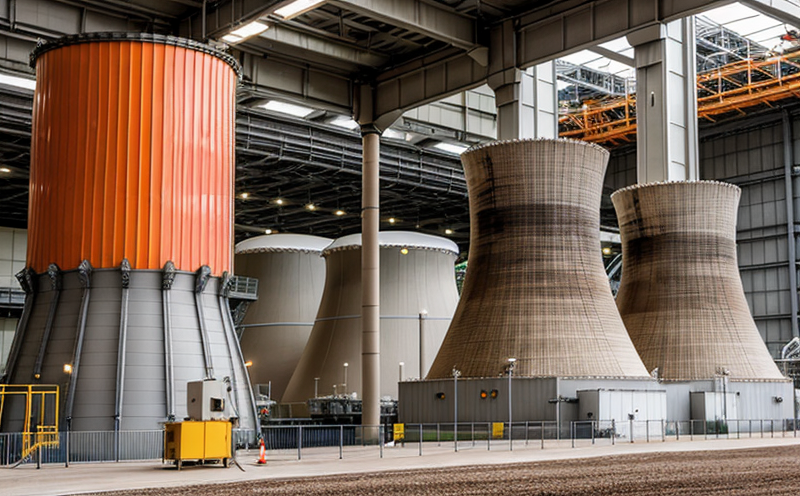ASTM G36 SCC Testing of Reactor-Grade Aluminum Alloys
The ASTM G36 standard provides a method to evaluate stress-corrosion cracking (SCC) susceptibility in various materials, including reactor-grade aluminum alloys used in the nuclear power industry. This testing is critical for ensuring the long-term reliability and safety of components within nuclear power plants. Stress-corrosion cracking can occur when metals are exposed to specific combinations of mechanical stress and corrosive environments, leading to premature failure.
Reactor-grade aluminum alloys present unique challenges due to their high-strength and low-density properties that make them ideal for use in nuclear reactor construction but also subject to SCC under certain conditions. The testing per ASTM G36 helps identify these vulnerabilities early on during material development or after manufacturing processes have been completed.
The process involves exposing specimens cut from actual production batches to controlled environments designed to mimic real-world operational conditions. Typically, this includes immersion tests where samples are exposed to chloride-containing solutions at elevated temperatures for extended periods. The goal is to observe whether cracks form along grain boundaries under these stress-corrosion conditions.
Once conducted, the results of ASTM G36 SCC testing play a vital role in determining appropriate corrective actions such as altering alloy compositions or adjusting fabrication techniques if necessary. Compliance with this standard ensures that materials used in critical parts like reactor pressure vessels meet stringent quality control standards set forth by regulatory bodies worldwide.
In summary, ASTM G36 SCC testing is an essential tool for validating the integrity of reactor-grade aluminum alloys intended for use within nuclear power plants. By identifying potential weaknesses early on through rigorous laboratory simulations, this test contributes significantly towards enhancing overall plant safety and operational efficiency.
Why It Matters
The importance of ASTM G36 SCC testing cannot be overstated when considering the demanding environment in which nuclear power plants operate. These facilities are exposed to harsh conditions that can accelerate material degradation, particularly if certain alloys exhibit poor resistance against stress-corrosion cracking.
Failure due to SCC is one of the most significant risks faced by reactor-grade aluminum alloy components. Such failures could lead not only to costly repairs but also pose serious threats to public safety and environmental health. By adhering to ASTM G36, manufacturers can ensure their products meet industry benchmarks for durability and reliability.
Regulatory compliance is another crucial aspect of why this test matters so much. Many countries have strict regulations governing the design and construction of nuclear facilities, including requirements regarding material testing methods like those specified in ASTM G36. Ensuring adherence to these standards helps avoid potential legal issues down the line while demonstrating a commitment to quality.
Moreover, implementing ASTM G36 SCC testing allows companies involved in nuclear power generation to maintain their competitive edge by ensuring they deliver superior product performance compared to non-compliant competitors. This can translate into better reputations among stakeholders and increased market share.
Eurolab Advantages
Eurolab offers unparalleled expertise and cutting-edge facilities dedicated exclusively to materials testing, including ASTM G36 SCC testing for reactor-grade aluminum alloys. Our team of highly trained professionals utilizes state-of-the-art equipment tailored specifically for this type of testing.
Our commitment extends beyond just conducting tests; we provide comprehensive support throughout the entire process from initial consultation through final report generation. This includes assistance with specimen preparation, ensuring proper environmental controls during testing, and interpreting results accurately against industry standards.
The accuracy and precision of our equipment coupled with rigorous quality assurance measures guarantee reliable outcomes that meet or exceed customer expectations. With years of experience in this field, Eurolab stands out as a trusted partner for those seeking dependable ASTM G36 SCC testing services.
Why Choose This Test
Selecting the appropriate material for nuclear power plant components requires careful consideration given both performance requirements and safety concerns. Stress-corrosion cracking represents a significant risk that needs to be addressed early in the design phase, making ASTM G36 SCC testing an indispensable tool.
By incorporating this test into your quality assurance protocols, you not only enhance the reliability of your materials but also demonstrate a proactive approach towards maintaining compliance with international standards. This can help build trust among stakeholders and improve overall confidence levels regarding product safety.
The insights gained from ASTM G36 SCC testing enable informed decision-making processes related to alloy selection, process optimization, and quality assurance strategies. Furthermore, adherence to this standard can facilitate smoother interactions with regulatory authorities, reducing the likelihood of delays or rejections during certification processes.





